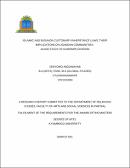| dc.description.abstract | The current study deals with Islamic and Buganda customary laws, their implications on Ugandan communities taking Kawempe division as the case study. The objective of this study is to examine the implications of the Islamic and Buganda customary inheritance laws to the development of Ugandan communities especially in Kawempe division.
This study applied both qualitative and quantitative methods. However, the study had several findings which included the following;-
Inheritance is an integral part of both Islamic and Buganda customary laws, both forms of inheritance save family and community crisis, management of inheritance is one of God’s commands, avoid the rift between relatives about inheritance, mismanagement of inheritance is condemned and punished, both laws advocate for the rights of people, cater for the status of a woman, both Islamic and Buganda customary inheritance laws encourage the distribution of estates promptly, inheritance caters for the needy in the community, inheritance is the continuity of life, inheritance implies generosity of man in the society, inheritance shows the difference between man and the prophets of God, inheritance serves as security, inheritance increases government revenues, inheritance is a source of capital, inheritance transfers responsibilities.
The study established ;Both Islamic and Buganda customary inheritance laws differ in terms of Property ownership, categories of the beneficiaries, shares allocated to both male and female inheritors, intestate succession, legitimacy of children, difference of religion, conditions for sharing inheritance, land ownership, the Muslim community refers to the 1964 marriage and divorce of Mohammedans Act, distribution of property differ from the two forms of inheritance as studied in Kawempe division.
The study identifies also the similarities between the Islamic and Buganda customary inheritance laws as per the perception of the people of Kawempe Division, which include the following;-
Both Islamic and Buganda customary inheritance laws with provision of laws pertaining to the distribution of wealth among heirs, both considers affinity and closeness in the identifying the beneficiaries of the estates of the deceased, both forms of inheritance cater for the status of a woman in the society to mention but a few. | en_US |

